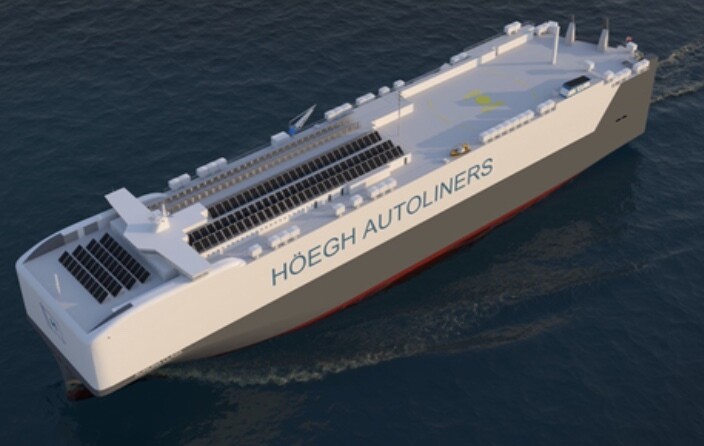Höegh Autoliners has designed a multi-fuel car carrier to help decarbonize shipping and its associated supply chains and it can carry more than 9,000 vehicles
Think car transporters and it’s possibly the double-decker, scary-to-meet-on-the-road vehicles that spring to mind. But when it comes to long haulage, new cars are most often shipped – nowadays in purpose-built vessels.
The process has evolved massively since the 1960s – from “tween-deck” general cargo ships to the roll-on-roll-off or “RoRo” pure car and truck carriers (PCTC) that have become the industry norm – but it still carries an environmental cost.
Given shipping’s long dependence on carbon-intensive fuels and the sheer scale of operations, it has traditionally been a big emitter of greenhouse gases. The maritime sector is currently responsible for almost 3% of global greenhouse gas emissions, but is also an area ripe for green innovation, according to the United Nations.
And breakthroughs in low- and zero-carbon fuels and other technologies are heralding hope of cleaning up the long-haul delivery journey.
Höegh Autoliners is taking up the challenge. In 2022, it was one of the first shipping firms to join the Forum’s First Movers Coalition (FMC), a group of companies working to advance the development of clean tech across the hard-to-abate sectors.
A global provider of RoRo transportation services, making around 3,000 port calls each year, the Norway-based company says it has developed the most environmentally friendly car carrier to date.
“We dreamed of taking the company in a whole new direction, adapting our current and future fleet to a green and more sustainable future. We succeeded in doing that with the launch of our Aurora class vessels and are now ahead of the pack in sustainable deep-sea transportation. No one has designed a similar vessel,” says Chief Operations Officer, Sebjørn Dahl.
The multi-fuel Aurora class vessel will be the first PCTC to operate on zero-carbon ammonia, but with DNV’s ammonia and methanol-ready notation, can be run on either fuel. It is also the largest of its kind, the company says – designed to carry 9,100 cars.
Twelve vessels are currently on order with China Merchants Heavy Industry (Jiangsu) Co, Ltd. Höegh Autoliners anticipates a delivery schedule of two every six months starting from the second half of 2024. The entire fleet will be digitalized, it says, with Vessel Insight – Kongsberg Digital’s cloud infrastructure – installed for their maiden voyages.
As an FMC member, Höegh Autoliners has committed to running at least 5% of its deep-sea operation on carbon-neutral fuels, and aims to achieve carbon neutrality across the enterprise by 2040.
Sebjørn Dahl adds: “The Aurora class represents the future of our business as well as the future of the industry. We are proud to be setting the gold standard by reducing our environmental footprint significantly and enabling our customers to decarbonize their supply chain as well.”
Read more on this story by the World Economic Forum HERE
Return to Decarbonisation News Index HERE





